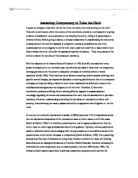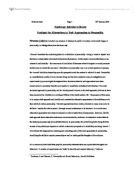The legal requirements for oath-taking competence require that the witness must understand the difference between truth and falsehood as well as the importance of telling the truth and the consequences of lying under oath. However, rules of competence do not require that a witness demonstrates an abstract understanding of the nature of truth and lies. If the witness understands that the truth refers to what ‘really happened’ and lies do not, he is considered competent in differentiating between the truth and lies. In addition, if a witness recognises that lying in court is wrong and may result in punishment, he is considered able to understand his obligations under oath.
A basic means of determining whether someone understands the difference between the truth and lies is to ask them to explain the difference. However, this might be difficult for someone who is very young, inarticulate or has a learning difficulty and finds it difficult to express what they mean. Alternatives include asking the witness to individually define ‘truth’ and ‘lie’ and to indentify whether a series of statements are true or false.
Although a number of researchers have examined understanding of the truth and lies in the courtroom, only one study has compared performance across different methods for assessing understanding. Pipe and Wilson (1994) asked children to explain the difference between the truth and lies and then made a false statement and asked whether it would be ‘the truth or a lie.’ They found that whereas only 8% of their 6-year-old participants were able to explain the difference, most were able to correctly label the false statement a lie. The researchers’ findings are consistent with anecdotal evidence from various cases in which children could identify truthful statements and lies but struggled to explain the difference between the terms. However, no research has determined whether this result can be generalised to older children or adults with learning difficulties.
In addition to understanding the difference between the truth and lies, witnesses must understand the importance of telling the truth in order to qualify as competent to take the oath. One is generally considered competent to take the oath if they understand that lying leads to punishment of some sort, yet does not necessarily need to be aware of the specific punishment for perjury (Lyons, 1999). Even children aged four and five have been found to understand the fact that lying is considered wrong and leads to punishment (Flin, Stevenson, and
Davies, 1989). However, little research has been conducted into whether maltreated children or children with developmental difficulties are able to comprehend the importance of telling the truth to the same extent, leading researchers to explore whether the moral development of maltreated children or children who have suffered some sort of trauma differs from that of non-maltreated children of the same age.
Lyon (1999) conducted two studies in which he assessed maltreated children’s understanding of lying and how such children understand the wrongfulness of lying. Participants were children aged four to seven years old who had been subjected to abuse, neglect or witness to violence or abuse. They were shown scenarios of children talking to authority figures such as judges or social workers, and asked whether telling the truth (or telling a lie) was good or bad, why it was so and whether it would make the authority figure happy or angry. It was found that even the youngest participants scored above chance in defining lying as bad and understanding that lying is coupled with anger from authority figures. Although they were unable to articulate why it is wrong to lie, they understood that lying was likely to lead to negative consequences.
In the subsequent study, four and five-year olds watched scenarios in which two children spoke to a professional; one of whom was telling the truth while the other was lying. They were asked which of the children would get into trouble. The results were consistent with the first study and even the youngest children were above chance in correctly identifying the liar as the child who would get into trouble. When the same tasks were given to a sample of three-year-olds, they were over 80% accurate.
Although McGough (1992) argued that ‘we can no longer safely assume that all children receive from their caretakers the same or even similar moral instruction, including the importance of truth-telling,’ the results of the above study demonstrate that both maltreated and non-maltreated children are aware of the consequences of lying at an early age and are able to distinguish between lying and telling the truth from the age of three. However, although the courts routinely enquire as to a witness’ understanding of the truth and comprehension of the consequences of lying or withholding the truth, rarely is the ability to understand the oath specifically assessed and this may be necessary in certain circumstances in which the wording of the oath may need to be altered to fit the witness’ developmental level.
The above studies provide some evidence for the utility of the oath in encouraging witnesses to reveal information, but the topic of whether people with learning difficulties such as ADD or adolescents who have committed offences are able to comprehend the necessity and consequences of the oath and can provide accurate testimonies is one which has received little attention. The results of the studies may imply, however, that even young children who have developmental difficulties or who have been subjected to abuse are able to differentiate between truth and lies and are aware of the consequences of lying, which suggests that most people would be able to comprehend the difference between the truth and lying and understand that lying results in punishment. This conclusion is tentative due to the limited research available on the effect of the oath and the fact that some witnesses may not be concerned about the consequences of the oath, even if they fully comprehend the consequences. In addition, testifying in court is likely to cause greater anxiety than that experienced by children in the study as the consequences of lying are real, which may alter what the individual feels able to disclose. A witness’ competence to take the oath therefore affects his ability to testify and, potentially, the outcome of the trial. The oath remains a mainstay of the trial process and as a result, it is necessary to conduct further research into whether certain groups of people may have difficulty in comprehending the oath.
References
-
Cashmore, J. and Bussey, K. (1996) Judicial Perceptions of Child Witness Competence. Journal of Human Behaviour, 313-320.
-
Flin, R., Stevenson, Y., and Davies, G. (1989). Children's knowledge of court proceedings. British Journal of Psychology, 80, 285-297.
-
Gold, V.J., (1992) Do the Federal Rules of Evidence Matter? 25 LOY. L. A. L. REV. 909-911.
-
Lyon, T. D., & Saywitz, K. J. (1999). Young maltreated children’s competence to take the oath. Applied Developmental Science, 3, 16–27.
-
McGough, L. (1992) Commentary: The Occasions of Perjury. Cognitive and Social Factors in Early Deception, 147-157.
-
Pipe, M-E. and Wilson, J.C. (1994). Cues and secrets: Influences on children's event reports. Developmental Psychology, 30, 515-525.
-
Smith, S. E., and G. S. Elstein (1993). The Prosecution of Child Sexual and Physical Abuse Cases. Washington, DC: American Bar Association Fund for Justice and Education.
-
Whitcomb, D. (1992). When the victim is a child (2nd. ed.). Washington (DC): Department of Justice.







